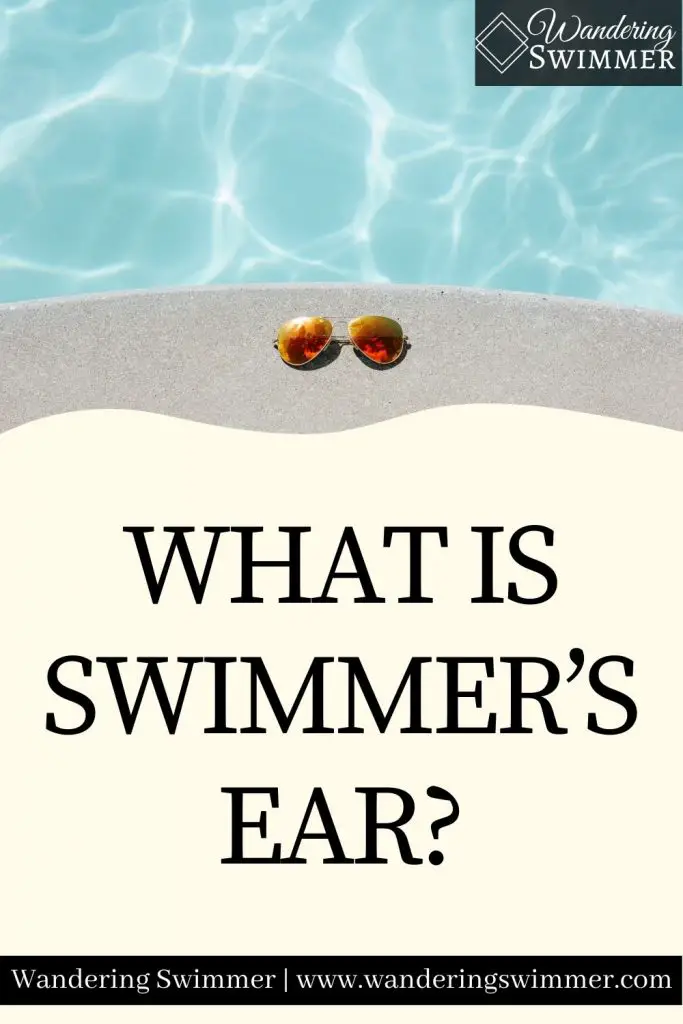The phrase swimmer’s ear gets tossed around at the pool, especially around the summer months. But what is swimmer’s ear? And is it something you can get even if you’re not a swimmer?
DISCLAIMER: I am not a doctor or health care professional. This guide is meant only to inform and act as a broad guideline. It’s not medical advice or law, and shouldn’t be interpreted as such. If you think you have swimmer’s ear or want more information on it, please consult your doctor.
Disclosure: This post may contain affiliate links, meaning I earn a small commission at no cost to you if you purchase something through one of my links. As an Amazon Associate, I earn from qualifying purchases. Please check out my disclosure page for more information.

What is Swimmer’s Ear?
Swimmer’s ear (otitis externa) is an infection in the ear canal. It’s caused, typically, by water that stays in the outer ear canal and allows bacteria to grow.
If left untreated, it can become painful and can lead to a more serious issue.
And despite its name, you don’t have to be a swimmer to get it! More on that in a second 🙂
Symptoms
The symptoms of swimmer’s ear vary by each individual. Some people may only experience the frustrating crackle in their ear(s). While others might develop pain behind their ear.
Some symptoms to look out for are:
- Crackling in the ear (especially when you yawn)
- Muffled hearing or trouble hearing
- Pain whenever you touch your ear
- Itchy ear(s)
It’s important to note that swimmer’s ear can occur in only one ear or both ears.
Who Can Get Swimmer’s Ear?
While younger children tend to get swimmer’s ear more than other ages, anyone can suffer from it. Yes, that means adults and teens, too! It’s not uncommon to have someone on a swim team suffer from the infection throughout the year.
And don’t let the name fool you. It’s not just swimmers who can get it. Even if you’re splashing around in the pool, at the beach, or the lake, you can get otitis externa.
If you have pain in your ear(s), don’t discount that it’s not swimmer’s ear just because you haven’t been in a pool. Or any other body of water. You can also get it just from showering or taking a bath.
Prevention
Disclaimer: I’m not a doctor or health care provider. Check with your health care provider to see if ear drops are the best option for you. They shouldn’t be used if you have ear tubes, ruptured eardrums, or other ear issues.
The good news is you can take steps to help prevent swimmer’s ear. As a disclaimer though, I will note that even though you can take steps to prevent swimmer’s ear, it’s not 100% guaranteed that you’ll never get it.
These are only preventative measures, not a guarantee.
To help prevent swimmer’s ear, use ear drops that are specifically for drying out ears. Use them whenever you submerge your head in the water. Whether that’s the pool, a shower or bath, or just playing in the rain. 🙂
After you get out of the pool, put a few drops in each ear. Rub behind the ear (near the base) to help disperse the drops better.
You can buy ear drops for swimmers at most stores. However, it’s typically easier to find them in the summer months. At least it is where I live 🙂 As a precaution, we do stock up in the summer just in case.
As an alternative, you can make your own ear drying mixture with rubbing alcohol and white vinegar.
You can also use swimming specific ear plugs to help prevent swimmer’s ear. Put these in your ears before you get in the water to get the best seal possible. To double their impact, follow up with ear drops after your swim!
Related article: The 6 Best Earplugs for Swimming
Want more suggestions to help prevent swimmer’s ear? Head over to How to Prevent Swimmer’s Ear for some additional advice.
What do I do if I Think I Have Swimmer’s Ear?
Go see your health care provider.
It might seem like overkill to go to the doctor over a sore ear but swimmer’s ear can be painful. And it should be treated to help prevent any complications in the future.
If you suspect you have swimmer’s ear or if you know you do, keep your ear dry. Avoid swimming until the infection has gone away.
If you swim on a team, be sure to let your coach know so they don’t think you’re skipping practice. They can also have you come in for some dryland workouts in place of a water workout.
–Chevron
Bonus Content:
4 Ways to Prevent Swimmer’s Ear: Swimmer’s ear can be a painful experience if left untreated. That said, there are steps you can take to help prevent swimmer’s ear.
Swimming Basics to Get You Started: If you just started to swim, you might feel that swimming can be overwhelming. Here are some swimming basics to help you feel more comfortable at the pool.